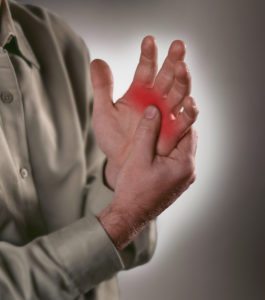Seniors & Arthritis: Causes, Symptoms and Care
What is Arthritis?
 Arthritis is painful inflammation and stiffness in one or more of the joints. Arthritis is not always well understood. It is not a single disease, the term Arthritis is an informal way of referring to joint pain.
Arthritis is painful inflammation and stiffness in one or more of the joints. Arthritis is not always well understood. It is not a single disease, the term Arthritis is an informal way of referring to joint pain.
There are many different types of Arthritis and other related conditions. Common symptoms are swelling, pain, stiffness and decreased range of motion. Simply put Arthritis is wear and tear on the cartilage of the joints. The cushioning membrane that allows the joints to move freely is the cartilage. When that cartilage wears out, it’s called Arthritis.
Arthritis causes the cartilage to deteriorate and break down. When it breaks down it causes the bones to rub together which causes pain and inflammation. Experts and specialists don’t really know why the cartilage breaks down. However, certain things such as aging especially in seniors, injuries, overweight and even genetics all can be a reason.
Although pain is the main troublesome symptom of arthritis, fatigue is also a symptom. Just being in pain day to day will cause one to be fatigued.
The most common form of Arthritis is Osteoarthritis (OA). The Cartilage or cushioning surface on the ends of the bones wear away, then bone rubs against bone causing pain, stiffness and swelling. When an elder has OA simple activities of daily living like taking steps, opening a door handle, or petting your pet dog can hurt. Seniors are most likely to have Osteoarthritis in the hands, neck and knees.
Another common Arthritis is Inflammatory. Our own immunity generates internal inflammation to get rid of infection and prevent disease. Sometimes the immune system can go wrong and starts attacking the joints causing inflammation.
These are just a couple types of Arthritis. However, as mentioned earlier there are many different types of Arthritis. Although any person can get Arthritis, seniors are more likely to be suffering with Arthritis. If your loved one has Short Term Memory Loss or Dementia or Alzheimer’s disease it’s very important to look for the signs of Arthritis.
Many times when your elderly mother or father with memory loss may have anxiety it could very well be from pain and discomfort. Pain and discomfort can cause anyone to be anxious especially an elderly person with memory loss. They may have a difficult time expressing themselves that is why it is important to be aware of ailments that may cause pain such ad Arthritis.
What can you do for Arthritis?
The main goal is not to fix as that is not currently possible but to reduce the pain associated with Arthritis. One way of reducing the pain is with medications. There a several different types of medications.
Analgesic such as Vicodin or Tylenol can help ease pain but they do not decrease the inflammation of the joints. For inflammation we use anti-inflammatory drugs (NSAIDs) such as ibuprofen. There are also topical creams such as menthol or capsaicin creams that help block the transmission of pain signals from the joints.
Other Ways to Reduce Pain is to control body weight. Essentially being overweight just increases the load that you place on your joints, your knees, hips and ankle. Each step you take with excess weight is an unnecessary stress on the joints.
When going about our daily lives simply walking up the stairs or getting up we put more than three to five time our weight on the joints. So if you are 60 pounds overweight that is essentially up to 300 pounds of extra weight and stress on your joints.
The good news is that if extra weight causes more stress on the joints then less weight reduces stress. You don’t have to be in perfect weight category, even losing 25 pounds will make a big difference in pain and comfort.
When families have an elder mother or father who is suffering from Arthritis it might be wise to speak with your family physician about ways to manage and alleviate pain. If your loved one has Short Term Memory Loss or Dementia of some sort its even more important to speak with your family physician.
For more information about Pipestone Place Assisted Living in San Antonio, TX or to take a tour, call Manager Samuel Vesa today (210) 718-0211.
- Thank You, Family Caregivers - November 22, 2022
- Fall Activities for Seniors with Dementia - October 28, 2022
- 7 Benefits of Memory Care for Seniors and Their Loved ones - September 26, 2022
